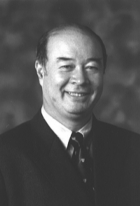Community Forum Prepares for Bangkok
Large turnout for Seven Sisters Conference
April 2004—Though it was planned for only 100 participants, nearly 300 delegates from Sri Lanka to Nepal and Papua New Guinea to Fiji met at the Asia Pacific Alternative Community Forum in Bangkok, January 12–14. The conference was intended to fill the void left when the biennial International Congress on AIDS in Asia and the Pacific (ICAAP) was cancelled.
The Coalition of Asia Pacific Regional Networks on HIV/AIDS (the “Seven Sisters”) stepped in to provide a critical opportunity for organizations to prepare for the 15th International AIDS Conference in Bangkok in July. Sponsored in part by TREAT Asia, the forum enabled community groups working in HIV/AIDS to network, share concerns, build upon each other’s experiences, and plan for the future.

Thai Senator Mechai Viravaidya
|
Tying into the “Access for All” focus of the upcoming Bangkok Conference, the Forum chose the theme “Towards Community Access.” Thai Senator Mechai Viravaidya welcomed participants working in areas such as care, treatment, harm reduction, sex work, migrant work, gender, and sexuality, with a call for greater involvement of all sectors of society in the battle against HIV/AIDS.
Following Senator Mechai, each of the Seven Sisters gave an update on the year’s progress. Subsequent first-day sessions included a presentation by Dr. Bjorn Melgaard of the World Health Organization (WHO) in Thailand on the WHO’s “3 by 5” strategy to have three million people on antiretroviral therapy by the end of 2005. Ni Chia Chen from the Gender/Sexuality Rights Association with Taiwan shared her experience with prevention efforts in Taipei, and Dr. Tariq Zafar of the Asia Harm Reduction Network spoke broadly about the cultivation of better harm reduction skills.
On the second day of the conference, Kevin Frost, amfAR’s Vice President of Clinical Research and Prevention Programs and Director of TREAT Asia, led a workshop on the importance of treatment literacy in the community setting and the steps that are necessary to achieve it.
Teresita Marie Bai Bagaso, Chief of Partnerships for UNAIDS, reported on the progress of the Declaration of Commitment made in June 2001 at the United Nations General Assembly Special Session on HIV/AIDS (UNGASS). Doris de Cruz and Kate Thompson, representing the Global Fund to Fight AIDS, Tuberculosis and Malaria, spoke about the organization’s funding process and the need to involve the community in it, especially as part of country coordination mechanisms. In a break-out session, several community groups expressed frustration that the Global Fund, though seeking their inclusion, was not making more demands upon governments to ensure community involvement in the funding application process.
One of the Forum’s main goals was to make sure community concerns would be heard at the 15th International AIDS Conference in Bangkok in July. Several theme-based workshops helped to prepare community organizations for meaningful participation and strategy development.
The Seven Sisters includes the Asia Pacific Network of People Living with HIV/AIDS (APN+), Asia Pacific Network of Sex Workers (APNSW), AIDS Society in Asia Pacific (ASAP), Asia Pacific Council of AIDS Service Organizations (APCASO), Asia Harm Reduction Network (AHRN), Co-ordination of Action Research on AIDS & Mobility (CARAM Asia), and Asia Pacific Network of Lesbians, Gays, Bisexuals & Transgenders (AP Rainbow).
The forum was sponsored by GlaxoSmithKline Positive Action, the Australian Red Cross, UNAIDS, UNDP, the Global Fund to Fight AIDS, Tuberculosis and Malaria, International HIV/AIDS Alliance, and TREAT Asia.